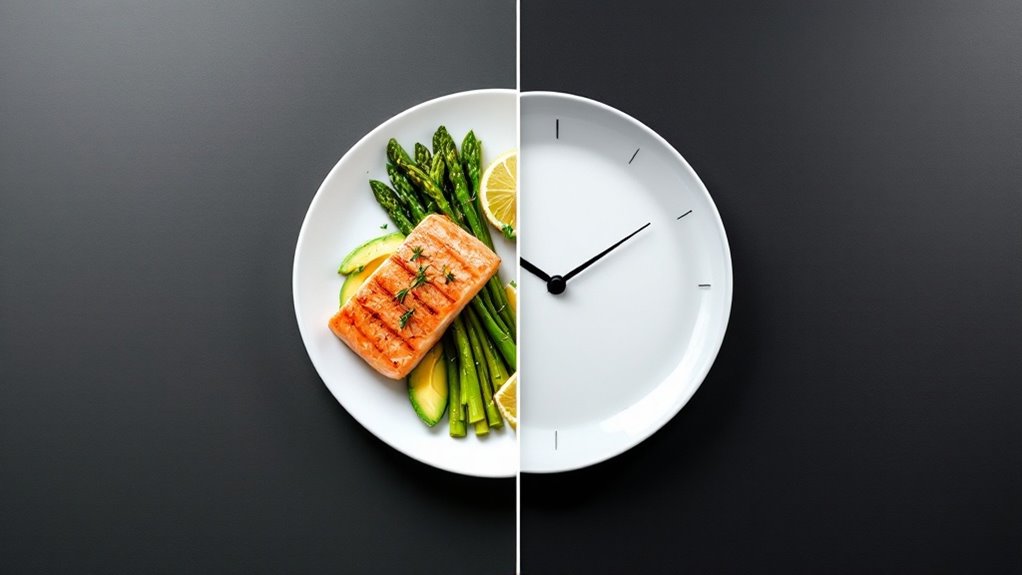Keto and intermittent fasting both work, but they’re different beasts entirely. Keto hits hard and fast, delivering dramatic initial weight loss through strict carb restriction and high fat intake. Intermittent fasting takes the slow-and-steady approach, dropping 7-11 pounds over 10 weeks while offering more food flexibility. Keto’s like a sprinter, fasting’s your marathon runner. Each has its drawbacks – nutrient deficiencies for keto, hunger pangs for fasting. The real choice depends on your personal lifestyle and how much bacon you’re willing to eat.

While dieters continue to duke it out over which weight-loss method reigns supreme, two heavyweight contenders have emerged from the pack: the ketogenic diet and intermittent fasting.
Let’s face it – these aren’t your grandmother’s weight loss plans. Keto hits hard with its low-carb, high-fat approach, forcing your body to burn fat instead of those beloved carbs. Meanwhile, intermittent fasting plays it cool, simply asking you to watch the clock instead of obsessing over every morsel that crosses your lips.
The results? Keto delivers knockout punches early, with dramatic weight loss in the first few weeks. It’s like the sprinter of diets – fast out of the gate but potentially winded for the long haul. The catch? You’ll need to say goodbye to pasta, bread, and pretty much anything that makes life worth living. Just kidding. Sort of. A proper keto diet requires 70-80% fat intake of your total daily calories.
Keto hits like a dietary knockout punch – fast results up front, but brace yourself for a lifetime breakup with carbs.
Intermittent fasting, on the other hand, is more like the marathon runner of weight loss. It’s steady, sustainable, and doesn’t care what you eat – just when you eat it. Studies show people typically drop 7-11 pounds over 10 weeks. The popular 16:8 method has shown impressive results for many dieters. Most people choose to eat between noon and 8 PM for optimal results. Not too shabby for simply playing with your meal timing.
Here’s where things get interesting: some brave souls combine both approaches. It’s like the dietary equivalent of wearing a belt and suspenders – maybe overkill, but boy does it work. The combination can accelerate ketosis and amp up fat loss, though it might turn you into a hangry monster if you’re not careful.
But let’s get real – neither option is perfect. Keto can leave you nutrient-deficient if you’re not careful, and long-term effects are still a mystery. Intermittent fasting isn’t great for pregnant women or people with certain health conditions.
And both can make you temporarily irritable enough to make your family consider moving out.
The bottom line? Intermittent fasting tends to win the sustainability race, while keto takes the crown for rapid results. Choose your fighter wisely – and maybe consult your doctor before jumping into either ring.
Frequently Asked Questions
Can You Combine Keto and Intermittent Fasting for Better Weight Loss Results?
Combining keto and intermittent fasting can supercharge weight loss results.
The duo works like a fat-burning dream team – keto kicks the body into ketosis faster, while fasting amplifies fat breakdown.
But it’s not all sunshine and rainbows. The combo can be tough to maintain and isn’t for everyone.
Think dehydration, nutrient deficiencies, and mood swings. Medical supervision? Probably a smart move.
How Long Does It Take to See Results With Each Diet?
Keto delivers quick initial results – expect water weight loss within two weeks.
After that, steady fat loss of 1-2 pounds weekly, with peak results around five months.
Pretty impressive stuff.
Intermittent fasting? Not so fast.
Results typically take a month or longer to show up.
But don’t panic – the slower pace often means more sustainable outcomes.
Plus, both approaches can work even better when combined.
Just pick your poison and stick with it.
Which Diet Is Better for Maintaining Muscle Mass During Weight Loss?
Neither diet is inherently better for muscle preservation – it’s all about protein and exercise.
Intermittent fasting can maintain muscle mass when combined with regular weight training and adequate protein intake during eating windows.
Keto dieters need to focus on hitting protein targets too.
The real MVP? Resistance training. Without it, both diets could lead to muscle loss.
Smart meal timing and proper nutrition matter more than the diet itself.
Are There Any Age Restrictions for Either Keto or Intermittent Fasting?
Both diets come with age-related considerations.
Keto isn’t recommended for kids or teens without medical supervision – it could mess with their growth.
Intermittent fasting’s more flexible across age groups, but still needs caution.
Seniors should watch out on both diets.
The real dealbreaker? Health status matters more than age.
Anyone with medical conditions needs a doctor’s green light first. Period.
What Supplements Should I Take While Following These Diets?
Essential supplements for these diets include magnesium and electrolytes – non-negotiable basics.
MCT oil can boost energy levels, while digestive enzymes help with that low-carb life.
Vitamin D and lean proteins? Yeah, those too.
But here’s the kicker: supplements aren’t FDA regulated.
Smart move? Talk to a doctor first. No one needs surprise side effects from random keto gummies.









